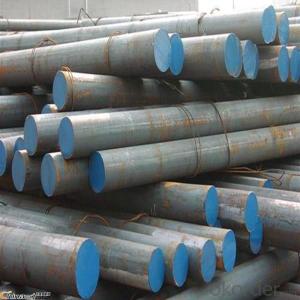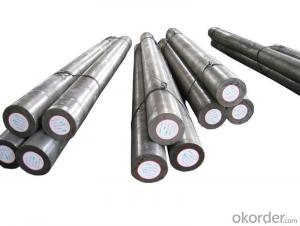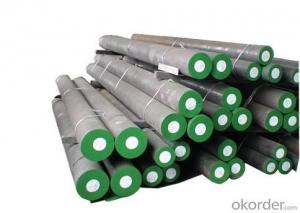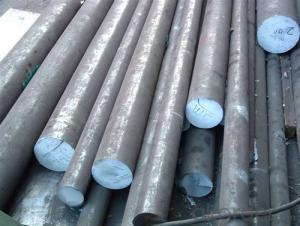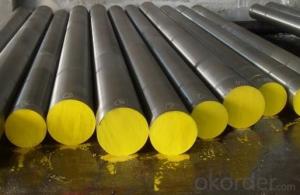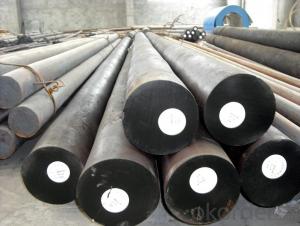Cr12 Steel Round Bars D3 Galvanized Round Bars Din1.2080 Tool Steel
- Loading Port:
- China main port
- Payment Terms:
- TT OR LC
- Min Order Qty:
- 25 m.t.
- Supply Capability:
- 100000 m.t./month
OKorder Service Pledge
Quality Product, Order Online Tracking, Timely Delivery
OKorder Financial Service
Credit Rating, Credit Services, Credit Purchasing
You Might Also Like
Item specifice
Standard:
AISI,JIS,GB,BS,DIN,API,EN,ASTM
Technique:
Hot Rolled,Cold Rolled,Cold Drawn,ERW,Forged,Saw,Extruded,EFW,Spring
Shape:
U Channel,Square,C Channel,Hexagonal,Round,Rectangular,Oval,LTZ
Surface Treatment:
Galvanized,Coated,Copper Coated,Color Coated,Oiled,Dry,Chromed Passivation,Polished,Bright,Black,PVDF Coated
Steel Grade:
Q195,Q215,Q235,Q215B,Q235B,RHB335,HRB400,200 Series,300 Series,400 Series,600 Series,SS400-SS490,10#,20#,A53(A,B)
Certification:
ISO,SGS,CE
Thickness:
as required
Length:
as required
Net Weight:
as required
| Cr12 Steel Round Bars D3 Galvanized Round Bars Din1.2080 Tool Steel | |||||||||||
| Comparative standard | Grade | C | Si | Mn | Cr | Mo | V | W | P | S | Ni |
| GB | Cr12 | 2.00-2.30 | ≤0.40 | ≤0.40 | 11.5-13.0 | - | - | - | ≤0.030 | ≤0.030 | - |
| AISI | D3 | 3.00-2.35 | 0.10-0.60 | 0.20-0.60 | 11.0-13.5 | - | ≤1.00 | ≤1.00 | ≤0.030 | ≤0.030 | - |
| W-Nr. | 1.2080 | 1.90-2.20 | 0.10-0.60 | 0.20-0.60 | 11.0-13.0 | - | - | - | ≤0.030 | ≤0.030 | - |
| DIN | X210Cr12 | ||||||||||
| BS | BD3 | 1.90-2.30 | ≤0.60 | ≤0.60 | 12.0-13.0 | - | ≤0.50 | - | ≤0.030 | ≤0.030 | - |
| JIS | SKD1 | 1.90-2.20 | 0.10-0.60 | 0.20-0.60 | 11.0-13.0 | - | ≤0.30 | - | ≤0.030 | ≤0.030 | - |
| KS | STD1 | 1.80-2.40 | ≤0.40 | ≤0.60 | 12.0-15.0 | ≤0.30 | - | ≤0.030 | ≤0.030 | - | |
| Dimensions | |||||||||||
| Round bar | |||||||||||
| Dia:20mm~650mm | Length:2000mm~5800mm | ||||||||||
| Flat bar | |||||||||||
| Thickness:20mm~650mm | Length:2000mm~5800mm | ||||||||||
| *Dimensions can be customized | |||||||||||
| Heat Treatment | |||||||||||
| Hardness | 61~54HRC | - | |||||||||
| Anneal | 870-900°C | ≤217-255HBW | |||||||||
| Quenching | 930-980°C | oil cooling | |||||||||
| Tempering | 200-540°C | 61-54HRC, tempering twice | |||||||||
| Detail information | |||||||||||
| Process | EAF+LF+VD+(ESR)+Forging+(Rolling)+Annealing Condition (optional) | ||||||||||
| Delivery Condition | Hot forged+Rough machined/turned surface | ||||||||||
| Technical Data | According to customer’s requirements of chemical composition, physical properties and mechanical testing | ||||||||||
| Ultrasonic Test | Ultrasonic test according to SEP 1921-84 G3 D/d E/d | ||||||||||
| Applications | |||||||||||
| Hot extrusion dies, forging die forging hammer, forging press die, precision forging die well as aluminum, copper and alloys die-casting mold. | |||||||||||
| Relevant documents | |||||||||||
| Contract Documents | Contract, Debit Note, PI(Performa Invoice) | ||||||||||
| Certifications | SGS, ISO9001-2008, UT(Ultrasonic Test), CO,MTC | ||||||||||
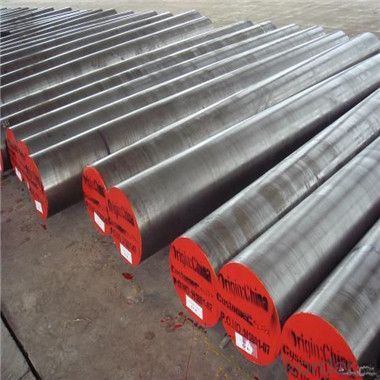
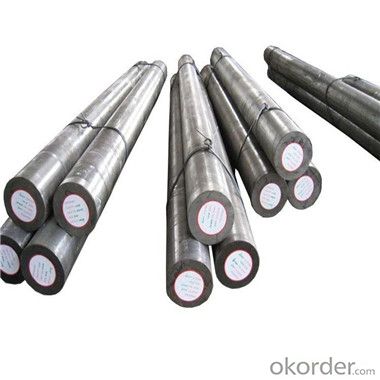
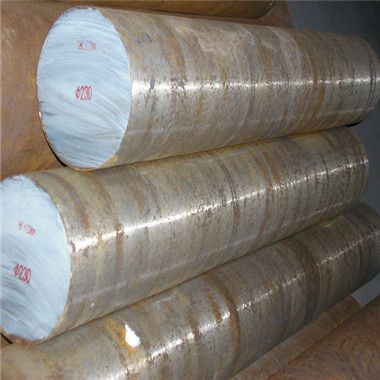
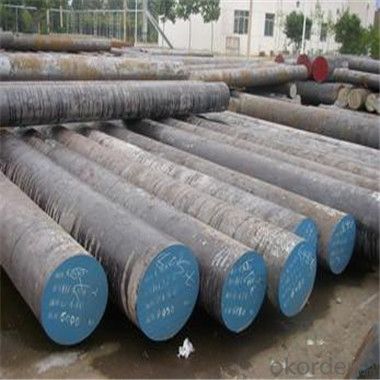
- Q:What is the difference between a rough turned and a centerless ground steel round bar?
- A rough turned steel round bar is a type of steel bar that has been partially machined to remove excess material and create a rough surface finish. It undergoes a turning process on a lathe, which removes the outer layer of the steel bar to achieve a specific diameter and shape. On the other hand, a centerless ground steel round bar is a type of steel bar that has undergone a precise grinding process to achieve a smooth and polished finish. This process involves feeding the steel bar through a centerless grinder, which removes any imperfections or irregularities on the outer surface, resulting in a consistently smooth and uniform diameter. In summary, the main difference between a rough turned and a centerless ground steel round bar lies in the level of surface finish and precision. Rough turned bars have a rougher surface finish and are not as precisely sized as centerless ground bars, which have a smooth, polished finish and are manufactured with tighter tolerances.
- Q:How are steel round bars used in the construction of stadiums and sports facilities?
- Due to their strength, durability, and versatility, steel round bars find wide application in the construction of stadiums and sports facilities. Typically made from carbon steel, these bars come in various diameters and lengths to cater to the specific requirements of each project. An important function of steel round bars in stadium construction is reinforcing concrete structures. They are commonly embedded within concrete columns, beams, and slabs to enhance their load-bearing capacity and overall structural integrity. The exceptional tensile strength of steel enables it to withstand heavy loads and provide crucial support for large seating areas, roofs, and other architectural elements. Moreover, steel round bars are utilized in the construction of stadium roofs and canopies. These structures demand a material that is both strong and lightweight, capable of spanning long distances without excessive reliance on support columns. Steel bars, when designed and installed properly, offer an optimal solution by providing the necessary strength while minimizing the number of support elements, thus allowing unobstructed views and spacious seating arrangements. In addition, steel round bars are commonly employed in the fabrication of stadium fences, guardrails, and handrails. These components are essential in ensuring the safety and security of spectators, preventing falls or accidents in elevated areas, and guiding the flow of people within the facility. The high tensile strength of steel makes it an ideal material for these applications, providing the necessary resistance against impact. To summarize, steel round bars play a crucial role in the construction of stadiums and sports facilities. Their strength, durability, and versatility make them the preferred choice for reinforcing concrete structures, constructing roofs and canopies, and fabricating safety components. By incorporating steel round bars, stadiums can be built to withstand heavy loads, offer unobstructed views, and ensure the safety of spectators, ultimately enhancing the overall experience for sports enthusiasts.
- Q:Are steel round bars suitable for high-temperature applications?
- Depending on the specific grade and composition, steel round bars can be used for high-temperature applications. Steel grades like stainless steel and heat-resistant alloys are designed specifically to withstand high temperatures without compromising their mechanical properties. These grades have high melting points, excellent heat resistance, and good oxidation resistance, making them ideal for industries such as aerospace, automotive, and power generation. For instance, stainless steel round bars offer exceptional corrosion resistance and high strength even at elevated temperatures. They can endure temperatures ranging from 800-900 degrees Celsius without significant loss of mechanical properties. Moreover, heat-resistant alloys like Inconel or Hastelloy are employed in extreme high-temperature settings like gas turbines or petrochemical plants, where temperatures can surpass 1000 degrees Celsius. Nevertheless, not all steel round bars are suitable for high-temperature applications. Carbon steels, for instance, are susceptible to oxidation and loss of strength when exposed to elevated temperatures. Low-grade steel round bars may also experience deformation, softening, or even failure under high-temperature conditions. Consequently, it is essential to carefully choose the appropriate steel grade and seek guidance from experts or engineers to determine the suitability of steel round bars for specific high-temperature applications.
- Q:What are the different surface hardness options for steel round bars?
- Steel round bars can have varying levels of surface hardness depending on the specific requirements and applications. Some of the different surface hardness options for steel round bars include: 1. Soft or annealed: This is the lowest level of surface hardness, where the steel is heated and then slowly cooled to reduce internal stress and increase ductility. Soft or annealed steel is easier to machine and form but has lower strength and wear resistance. 2. Normalized: Normalizing involves heating the steel to a specified temperature and then cooling it in air. This process refines the grain structure and improves the mechanical properties of the steel, resulting in increased hardness compared to annealed steel. 3. Quenched and tempered: This is a heat treatment process that involves heating the steel to a high temperature and then rapidly cooling it in a quenching medium like oil or water. The rapid cooling hardens the surface of the steel, while the subsequent tempering process reduces internal stresses and increases toughness. Quenched and tempered steel round bars have high hardness and strength, making them suitable for applications that require resistance to wear and impact. 4. Induction hardened: Induction hardening is a surface hardening process that involves heating only the surface of the steel round bar using an induction coil. This localized heating is followed by rapid quenching, resulting in a hardened surface layer with increased wear resistance. The core of the steel remains unaffected, retaining its toughness. 5. Case hardened: Case hardening, also known as carburizing, involves introducing carbon into the surface layer of the steel round bar. This is typically done by exposing the steel to a carbon-rich gas or by heating it with a carbon-containing material. The carbon diffuses into the surface and increases the hardness, while the core remains relatively softer. Case hardened steel round bars have a tough core with a wear-resistant surface. These are just a few of the different surface hardness options available for steel round bars. The choice of hardness will depend on the specific application requirements, such as strength, wear resistance, and toughness needed for the intended use.
- Q:Can steel round bars be used in the oilfield equipment industry?
- Yes, steel round bars can be used in the oilfield equipment industry. Steel round bars are commonly used in the manufacturing of various components and structures in the oilfield equipment industry due to their strength, durability, and resistance to corrosion. These bars are often utilized in the construction of drilling tools, pipe fittings, valves, and other equipment needed for oil exploration, extraction, and transportation.
- Q:How do steel round bars perform under static or stationary loads?
- Steel round bars are renowned for their exceptional performance when subjected to static or stationary loads. With their high level of strength and durability, steel round bars have the ability to endure heavy weights or forces without experiencing significant deformation or failure. When faced with static loads, these bars evenly distribute the applied force throughout their structure, guaranteeing stability and maintaining structural integrity. One of the primary benefits of steel round bars is their resistance to bending or sagging under static loads. Their inherent rigidity enables them to preserve their shape and prevent substantial deflection, rendering them ideal for applications that require significant load-bearing capacity. Additionally, steel round bars possess a high yield strength, granting them the capability to withstand substantial stress before permanent deformation takes place. Moreover, steel round bars exhibit minimal creep under static loads, signifying that they maintain their shape and dimensions over time, even when exposed to sustained pressure. This attribute proves particularly vital in structures or equipment that are expected to support constant loads for extended durations. Another element that contributes to the outstanding performance of steel round bars under static loads is their resistance to corrosion. Steel inherently resists rust and oxidation, rendering it suitable for use in various environments, including those with high levels of humidity or exposure to moisture. In conclusion, steel round bars are exceedingly dependable and efficient when it comes to managing static or stationary loads. They offer exceptional strength, resistance to deformation, and durability, making them the preferred choice across a wide array of industries, such as construction, manufacturing, and infrastructure development.
- Q:How do steel round bars compare to other materials like aluminum or titanium?
- Steel round bars have certain advantages over materials like aluminum or titanium. Steel is known for its high strength and durability, making it suitable for heavy-duty applications. It has a higher tensile strength compared to aluminum, which gives it better resistance to bending or deformation. Additionally, steel round bars have a lower cost compared to titanium, making them more economical for various projects. However, aluminum and titanium offer their own unique benefits such as lighter weight and greater corrosion resistance, which may make them more suitable for specific applications. Ultimately, the choice between steel, aluminum, or titanium round bars depends on the specific requirements and constraints of the project at hand.
- Q:What are the advantages of using nickel-alloy steel round bars?
- There are several advantages of using nickel-alloy steel round bars. Firstly, nickel-alloy steel has excellent corrosion resistance, making it suitable for use in harsh environments or applications where the material is exposed to corrosive elements. Secondly, nickel-alloy steel possesses high temperature strength and resistance to thermal expansion, making it ideal for use in high-temperature applications such as aerospace or power generation. Additionally, nickel-alloy steel offers good mechanical properties, including high tensile strength and toughness, which make it suitable for demanding applications that require strength and durability. Overall, the use of nickel-alloy steel round bars provides a combination of corrosion resistance, high-temperature strength, and mechanical properties, making it a versatile and reliable material choice in various industries.
- Q:What are the different types of steel round bars used in the manufacturing of bearings?
- The manufacturing of bearings involves the use of various types of steel round bars. The choice of steel depends on factors like the application, load capacity, and desired performance of the bearing. One popular option is through-hardened steel, which undergoes heat treatment to achieve consistent hardness throughout the bar. These round bars offer excellent strength and wear resistance, making them suitable for heavy-duty bearing applications. Another commonly used steel is case-hardened steel. In this case, the surface is hardened while the core remains relatively soft. This combination provides high surface hardness for wear resistance, as well as improved toughness and impact resistance. Stainless steel is another steel type utilized in bearing production, especially in environments where corrosion resistance is required. Stainless steel round bars have exceptional resistance to rust and corrosion, making them ideal for marine or chemical industries. Additionally, alloy steel round bars are commonly employed in bearing manufacturing. These steels are created by adding alloying elements like chromium, molybdenum, or nickel to enhance specific properties such as hardness, toughness, or heat resistance. Alloy steel round bars are often used in specialized bearing applications that require exceptional performance under high temperatures or extreme conditions. To summarize, the manufacturing of bearings involves different types of steel round bars, including through-hardened steel, case-hardened steel, stainless steel, and alloy steel. Each type offers unique properties and characteristics that make them suitable for specific bearing applications.
- Q:Can steel round bars be used in the manufacturing of pressure vessels?
- Yes, steel round bars can be used in the manufacturing of pressure vessels. Steel round bars offer high strength and durability, making them suitable for withstanding the high pressure environment inside pressure vessels. Additionally, steel round bars can be easily fabricated and welded, allowing for the construction of complex pressure vessel designs.
1. Manufacturer Overview |
|
|---|---|
| Location | |
| Year Established | |
| Annual Output Value | |
| Main Markets | |
| Company Certifications | |
2. Manufacturer Certificates |
|
|---|---|
| a) Certification Name | |
| Range | |
| Reference | |
| Validity Period | |
3. Manufacturer Capability |
|
|---|---|
| a)Trade Capacity | |
| Nearest Port | |
| Export Percentage | |
| No.of Employees in Trade Department | |
| Language Spoken: | |
| b)Factory Information | |
| Factory Size: | |
| No. of Production Lines | |
| Contract Manufacturing | |
| Product Price Range | |
Send your message to us
Cr12 Steel Round Bars D3 Galvanized Round Bars Din1.2080 Tool Steel
- Loading Port:
- China main port
- Payment Terms:
- TT OR LC
- Min Order Qty:
- 25 m.t.
- Supply Capability:
- 100000 m.t./month
OKorder Service Pledge
Quality Product, Order Online Tracking, Timely Delivery
OKorder Financial Service
Credit Rating, Credit Services, Credit Purchasing
Similar products
New products
Hot products
Related keywords
